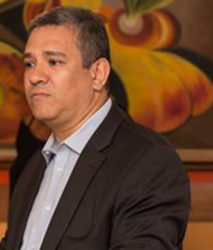In the face of frequent complaints about its slower than advertised DSL internet service, Guyana Telephone and Telegraph Company (GTT) Chief Executive Officer (CEO) Justin Nedd is guaranteeing that the problem would be rectified by the end of June.
“My first guarantee is that by June 30, 2017, some of my fellow Guyanese will experience the fastest and most affordable internet that Guyana has ever seen… We are well positioned to support Guyana’s drive to bridge the digital divide and really allow our beautiful land to continue grow, thrive and flourish,” Nedd said on Friday during the company’s annual media appreciation cocktail at Grand Coastal Hotel.
Nedd outlined GTT’s plans for its customers in 2017. “The pillar of this year’s guarantees lie in GTT providing high speed internet to homes and businesses. Since landing our US$30 million cable in 2010, we have continually improved the internet in Guyana and seen a significant increase in demand over the years,” he stressed.

Nedd said attention will be paid to the plight of those living on the Essequibo Coast.
“My second guarantee is that those people on the Essequibo Coast who have not had internet that is comparable to Georgetown and New Amsterdam and some of the more populated areas… I guarantee that by June 30, 2017, [they] will have internet on the Essequibo Coast that is at minimum 10 times faster than what they get now,” he said before guaranteeing that the prices that will be paid for those services will be competitive and more affordable that what is being offered now by competitors.
Nedd said that the final guarantee is that customers will have experiences that will continue to improve and eventually consistently delight. To make this happen, he said, feedback from customers is needed.

Meanwhile, the CEO also stated that GTT’s proposed increase in landline rates is being looked at and it remains hopeful that an agreement will be reached before liberalisation of the sector occurs.
“One of the things that is extremely important to us is being able to work with the Public Utilities Commission [PUC] to ensure that we get landline rates before liberalisation. We continue to provide the PUC with requisite information and we continue to support them to enable them to make a timely and an informed decision to get us those rates,” Nedd said.
In 2014, GTT had applied to raise the domestic rates for most of its services. The application had proposed increases for services such as installations, transfers, additional jacks, wake-up calls, three-way calling, voicemail, call forwarding and reconnection. It also sought to increase rates for intra-exchange calls during peak hours by 40% and during non-peak hours by 60%. The current intra-exchange call rate is $.60 (peak) and $.30 (non-peak). For inter-exchange calls (from one zone to another), it proposed increases by 20% for both peak and non-peak hours. The current rates for peak hours, per minute, are Zone A $3, B $4, C $5 and D $7. During non-peak hours the rates are $2, $3.6, $4.8 and $5, respectively.
The PUC had rejected the application in 2015.
The matter is currently before the court.
Despite the ongoing court matter, the company reopened talks on the rate increase with the commission in November, reasoning that rates had not been increased in 15 years and there was a loss of much needed revenue since persons were more reliant on their cellular phones.
Nedd also noted that 2016 was a successful year and expressed hope that this will also happen for 2017.
In addition to the guarantees outlined by Nedd, the company says that a new telephone directory app will become operational during the year.
The media was also introduced to GTT’s Chief Commercial Officer Carlos Mendosa. Mendosa, a national of Peru, who was officially appointed during the first week in December last year, has over 20 years of experience in the telecommunications sector.





